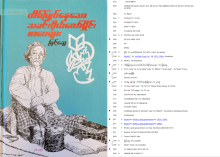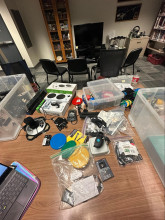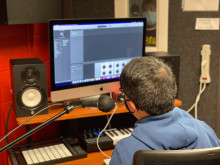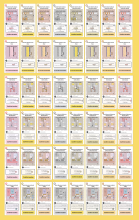Win Kyaw
Library Blogs
Showing 301 - 310 of 1980 items

From mid-May to mid-July this summer, I joined the U-M Library’s International Studies team as their Southeast Asian studies librarianship intern. I applied to the inaugural internship program, hoping to build upon my previous work experiences in metadata and cataloging services at three different academic libraries in California and Massachusetts. As a student copy cataloger and a part-time assistant, I mainly proofread certain parts of bibliographic records that are considered crucial (e.g. book titles, page numbers, etc.) and transferred records from a shared online database to a local one used by the U-M Library. In other words, I did what is called copy cataloging and other entry-level tasks involved in processing new library materials. In short, I arrived in Ann Arbor with the goal of expanding my understanding of librarianship, which was limited to a few library jobs I have had.

CVGA student resident Shiryn Anissa Noor Affendi reflects on her experiences investigating adaptive and accessible gaming technology.

Each year, the United States celebrates Women’s Equality Day on August 26th in recognition of the anniversary of women’s suffrage. This is an excellent opportunity to reflect on the strengths and shortcomings of women’s movements in the U.S. through the lens of intersectionality, which calls on us to understand the interweaving impact of all of our identities on how we experience the world.

The Design Lab will be hiring 2-3 enthusiastic undergraduates for the 2023-24 academic year. The application deadline is Thursday, August 31 and all applications will be reviewed on a rolling basis. Fill out the google form and upload CV/resume using the link located at the bottom the post.

Part two of our ongoing series on getting our dark repository back up and running. This post outlines our approach to moving forward.

Shutter is a thrilling, suspenseful novel about Rita, a Navajo woman who is a forensic photographer and who can see and talk to ghosts. Her unique ability helps her when investigating crime scenes, but she has to keep it secret. The ghost of a murder victim haunts Rita and insists that she find her killer, or she will make Rita's life a misery. The murder story is interspersed with the story of Rita's childhood on the Navajo Reservation and her relationship with her grandmother.

With the start of the school year just under 4 weeks away, it’s a great time to sneak in those last summer reads before recreational reading takes the back burner to school-related reading this fall. What better way to find your next summer book than this list of books that U of M Librarians, UMSI students, and famous authors love to read?

The Shadow and Light project seeks to memorialize Iraqi academics who were assassinated between 2003 and 2011. This summer we worked on curating the Shadow and Light materials to be displayed in Hatcher Graduate Library and creating an accompanying online exhibit.

My journey with learning about and applying web content and video game accessibility standards to Hatcher Haunts, a visual wayfinding mobile game prototype.

Did you know July is National Parks & Recreation Month? To celebrate, we recommend the books below to help you reconnect with the natural world around you. The Ann Arbor area is full of beautiful parks to read in on a sunny afternoon,and you can access any of these books easily electronically while you lounge outside! Not on campus? Since these books are online, you can read any of them from your favorite park wherever you are. Happy summer reading!